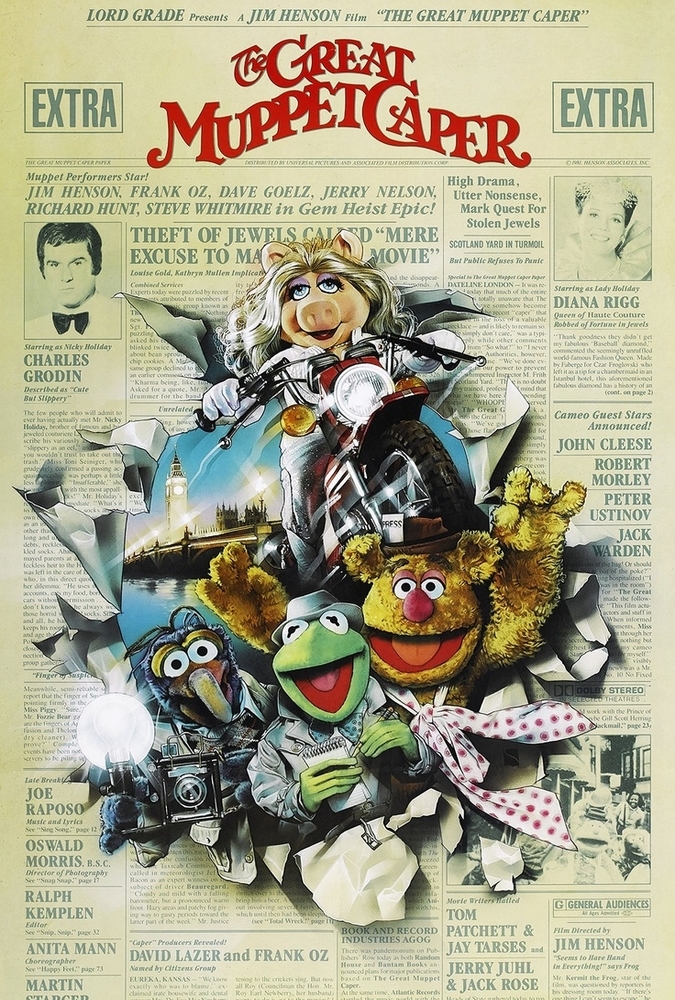I started working at Lit Hub/CrimeReads in July of 2019, which means I’ve been waiting nearly a year for the June 26th anniversary of The Great Muppet Caper to come around so that I can finally write a piece celebrating it. For months I sat in our office, writing other pieces, biding my time, awaiting the day that my greatest purpose might be fulfilled. I am but an instrument for The Great Muppet Caper. My editors, knowing how I feel about it, have been expecting this essay for eleven months, and now that I’m writing it, no thesis statement seems as critical as this simple exhortation: please watch The Great Muppet Caper. Please watch it. It’s great.
The plot device which propels The Great Muppet Caper is a string of brazen jewel thefts, but these do not preoccupy the timeline. Mostly, the film spends its time emulating aspects of other, non-crime film genres. This kind of sampling makes sense, given the ethos of Muppet entertainment in general. For instance, the chief gambit of The Muppet Show, which ran from 1976 to 1981, established that the Muppets were the team behind a live weekly variety show. They performed it in an old-fashioned theater (complete with pit orchestra), and their productions were recorded and broadcast on television. More than being a gang of felted and furry friends, as are the Muppet characters that Jim Henson had already developed for Sesame Street (which began its run in 1969), The Muppet Show has always been specifically about the ins and outs of show-business, and the drama that goes into mounting a theatrical performance. Thus, The Muppet Show was equal parts vaudeville acts and behind-the-scenes antics—just as much about the show as putting on the show. And because it was about the duality between onstage personas and off-screen reality, it could also effectively satirize celebrity culture.
The Muppets know that they’re putting on a show, but they don’t seem to know that they aren’t truly sentient.In 1979 came The Muppet Movie, the first feature film involving the Muppets. It is a funny, meta thing—not a prequel, but a kind of alternate history of their group. The film is the product of the Muppets making an origin story which suggests how they met one another and wound up in Hollywood, which means that the film is as much about the story as it is about the manufacturing of one. That movie, in which Kermit, a humble, banjo-playing, swamp-dwelling frog, is “discovered” by an agent, is about the excitement of potential movie-stardom. And the quirks and rules of Hollywood are accentuated by the sheer unlikeliness of the Muppet protagonists, who are seen as non-human creatures within the worlds of their narratives, and seen in the world of the audience additionally as puppets. This divide is noteworthy: the Muppets know that they’re putting on a show, but they don’t seem to know that they aren’t truly sentient. For all the meta-commentaries and mise-en-abymes of the Muppets’ oeuvre, they never acknowledge that they are literally controlled by strings, machinery, and human arms. The closest thing that happens is that The Muppet Movie features a cameo from the legendary ventriloquist Edgar Bergen. 
Regardless, The Great Muppet Caper, which was made two years later in 1981, is a continuation of The Muppet Movie‘s enthusiasm for the entertainment industry, and a further experiment in breaking the fourth wall. The Great Muppet Caper is a true sequel, in that it really attempts to build on what came before. The musical numbers are bigger, the story is more ambitious, and the technological sleight-of-hand is even more advanced (Kermit and Miss Piggy ride bikes together and this is captured in a medium shot in which you can see their whole bodies pedaling the bikes along! It’s even longer than the bike scene in The Muppet Movie! What? How?). There are numerous “behind the scenes” moments, including one in which Kermit pauses a scene he and Miss Piggy are currently acting to ask her to stop hamming things up so much. But most of all, The Great Muppet Caper feels a bit more high-stakes. While The Muppet Movie also features crime, The Great Muppet Caper foregrounds it drastically: Miss Piggy is framed and is thrown in jail.
Given the choice to feature a crime plot, it is curious how The Great Muppet Caper does not decide to pastiche the many different types of crime films. The film is more interested in emulating splashy, Golden Age of Hollywood musicals. Which is fine. It is also partially a love story, partially a tale of mistaken identity, partially a satire of the high-fashion world. When it does refocus the burglaries that Kermit and Co. are trying to solve, it does not resemble a detective story as much as a journalistic investigation. See, Kermit, Fozzie Bear, and the Great Gonzo are all reporters who fail to break a story about a jewel heist that happens during the opening number, right behind them. Fired from their newspaper, they set off for London, to try to interview the woman, Lady Holiday (Diana Rigg), who has been robbed. While across the pond, they end up on the trail of serial thieves, the ringleader of whom is Lady Holiday’s deadbeat brother Nicky (Charles Grodin, hooray!). But truthfully, most of the movie is about Kermit falling in love with Miss Piggy, an aspiring fashion model who impersonates her boss, Lady Holiday, because she wants to impress Kermit. The “crime” stuff is good fun when it happens, but it’s not the weightiest thing going on.
That The Great Muppet Caper sometimes ignores its own crime story framework helps locate one of the most important themes of the Muppets canon, one that is magnified when the Muppets take their shtick from half-hour broadcasts to feature films. Save for the single human guest host in each episode, The Muppet Show presents a take on show business that is totally captured through the Muppets’ perspective, allowing the show to effectively lampoon the human-world-counterpart concepts of fame, theater-making, and management. And in every episode of The Muppet Show, the chafing dynamics of the colorful, dysfunctional crew currently trying to pull off a pageant is enough to satisfy the need for conflict—especially when the conflict is stoked by the Muppets’ indignant grand-dame, Miss Piggy.
But in the Muppet movies, in which humans and Muppets coexist outside The Muppet Show‘s ironic showbiz microcosm, conflict must be found elsewhere. More often than not, it is produced by human characters who refuse to allow the Muppets to seamlessly assimilate into the human world. The Muppet Movie and The Great Muppet Caper flip the dynamic cultivated by The Muppet Show, which represents them as industry insiders just trying to get through the next gig. The Muppet Movie, and The Great Muppet Caper are about being outsiders to the entertainment industry, and navigating this experience. In The Muppet Movie, the Tinseltown-bound bard Kermit is hounded by a Frog Legs salesman (Charles Durning), who is determined to make Kermit his spokesperson. In The Great Muppet Caper, much of the trouble is caused by Miss Piggy’s incongruous desire to be a fashion model, for which she is both lauded and punished. In these films, conflict arises because Kermit is labelled by the human world as a frog and Miss Piggy is labeled a pig. In The Muppet Show, in which virtually everyone is a Muppet, no one gets stuck on terms like these.
The show is about inclusion, familiarity, and, most of all, a sense of belonging. The films are about navigating the world to find these things; in both these films, the various Muppet outsiders find one another in these strange and new places and form communities. In The Great Muppet Caper, this is done pretty comprehensively when Kermit, Fozzie, and Gonzo arrive in London and check into the Happiness Hotel, a rundown lodge that turns out to be operated and inhabited by Muppets. There’s even a song welcoming the trio of newcomers to the place, and it’s the best.
This scene is especially heartwarming, because it re-establishes that the most foundational part of Muppet entertainment is the actual community of Muppets. They are a theater company! It’s lovely to see them gather together; indeed, at the Happiness Hotel, so many Muppets cram together onscreen to sing the last crescendo of the welcome song that the entire frame is filled with them. The screen is packed with plush. And the Happiness Hotel is where we are reminded just how welcoming and unpretentious the Muppets are by nature; “you’ve got every kind of critter/you’ve got every kind of pest,” Scooter, one of the Muppets, sings about the fairly slovenly conditions of the Hotel. But Pops, the Muppet proprietor jumps in to add, “but we treat them all as equals just like any other guest!”
The movie is a light takedown of haughtiness and pretension, and particularly associates these things with cultures of “old money” and rigid social norms.Pops’s interjection in the song has great thematic implications. In The Great Muppet Caper, the myriad jewel thefts, all perpetrated by Nicky Holiday and three associates (unsmiling female fashion models), move the story forward, but they also stake the story in a culture of vanity and elitism. The thefts are all robberies of valuable diamonds, which signals society’s preoccupations with wealth, status, and luxury. The film has a lot to say about this mindset. Its heroes are a frog and a pig, both of whom are constantly treated like second-class citizens. Kermit, Gonzo, and Fozzie have to fly abroad in “ninth class,” in crates in the bowels of the plane, and get chucked out of the aircraft for a landing. Miss Piggy is referred to as a “pig” by Lady Holiday, to communicate a perception of her inward character. But Miss Piggy keeps trying to beg and trick her way into these exclusive circles; she wants to be thought of as high-class and wealthy. She makes Kermit take her to dinner at a chic Dining Club where he balks that the menu lists the roast beef as the same price as an Oldsmobile. There’s a reason why this film is set in London, of all places; the movie is a light takedown of haughtiness and pretension, and particularly associates these things with cultures of “old money” and rigid social norms. Nothing communicates this reproof clearer (or more funnily) than a scene in which Miss Piggy breaks into a large London mansion while the stuffy owners are dining downstairs and are having a conversation that is so formal it is incredibly boring.

Miss Piggy gets over her worship of the aristocracy, and that’s the real victory. There are few other victories, actually. By the end of the film, it’s not even acknowledged whether or not Kermit, Fozzie, or Gonzo will get their jobs at the newspaper back. Miss Piggy doesn’t get an apology from Lady Holiday, or her job reinstated. But none of these things really matter. The real crux of the movie, the complicated love story between Kermit and Miss Piggy, is more important to the narrative than anything else. Worse than scheming to steal a diamond (“the Baseball Diamond”) is that the thieves frame Miss Piggy for a previous heist, threatening her happy ending with her true love. All the Muppets must band together to save her, and they do. Although, another victory is that Miss Piggy ultimately rejects the romantic advances of the treacherous Nicky, who has fallen for her, and affirm her love for Kermit. This is especially significant because Nicky has previously tricked Miss Piggy into modeling, in order to frame her for the crime he committed. Joke’s on him; she receives acclaim before she is scapegoated. But by the end of it all, she realizes that she wants the love of a cohort of friends more than applause from strangers or the esteem of high society.
And she’s able to throw a thing or two in Nicky’s face; earlier, while she’s being hauled off to jail, she barks an insult to him about his performance in the previous scene, a synchronized water-ballet dream sequence in which he has sung about his desire for her while she has risen out of a pool atop the plume of a fountain. “Your voice,” she sneers at him as she’s being dragged away, “was dubbed,” making him a puppet, rather than the other way around.
The humans in The Great Muppet Caper seem to do little more than get in the way; when Kermit is sitting alone, contemplating what has happened between him and Miss Piggy, Peter Falk comes along out of nowhere and tries to cheer him up. When he digresses for too long, Kermit tells him “I hate to be rude, but we’re trying to do a movie here.”
Ultimately, The Great Muppet Caper doesn’t spend too much time dwelling on its bad people, or really, any people at all. And that’s fine—humans aren’t the main attraction, anyway. (It is worth mentioning that the film features a wonderful slew of human cameos, including Jack Warden, Peter Ustinov, and John Cleese. Still, the best special appearance winds up being from Oscar the Grouch.) Many of the Muppet movies are about a kind of takeover of human spaces or stories by the collective of Muppets; just think about the titles of the Muppet movies that will come next, including Muppets Take Manhattan and Muppet Treasure Island. They take over places where they don’t seem to belong or places where they are not wanted.
Such is the case in The Great Muppet Caper. Except, in this film, the Muppets don’t overrun a place or a thing so much as overhaul the snobbery that generally governs this kind of exclusivity. But, for all their hoopla, they have things under control. No one will make outsiders of the Muppets. At least, not for long.

















